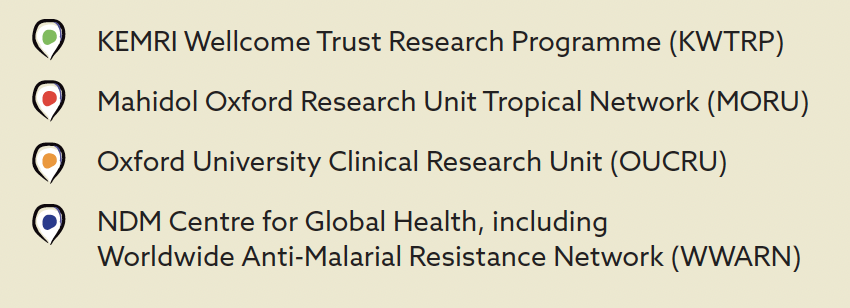The Nuffield Department of Medicine's units including the Jenner Institute and the network of Tropical Medicine research centres are at the forefront of malaria research. Their research includes basic research, diagnostics, drug discovery, clinical trials, bioethics and social sciences.


MORU: Studies led by MORU have led to the development of artemisinin-based combination (ACT) therapies for uncomplicated falciparum malaria and these are now standard first-line treatments globally, recommended in the World Health Organisation (WHO) Guidelines for Malaria.
Injectable artesunate is recommended as the first-line treatment for severe falciparum malaria based on studies led by MORU which showed a mortality reduction of 23% in children and 35% in adults compared to the previous first-line treatment quinine.
MORU was among the first research units to describe the emergence of artemisinin-resistant malaria in Southeast Asia, and then documented its expansion and spread. This evidence led directly to major efforts to rapidly eliminate falciparum malaria from Southeast Asia to prevent the spread of resistant parasites from the region.
KWTRP: Studies led by KWTRP have led to the demonstration of bed nets being protective against malaria, and showing that intermittent preventative treatment among pregnant women reduced the risk of anaemia. Trials of fluid therapy and transfusion for children with severe malaria led to changes in existing malaria management guidelines. KWTRP also described the prevalence of falciparum malaria across sub-Saharan Africa since 1900.

WWARN: Since its launch in 2009, WWARN has assembled and analysed over 120,000 individual patient records from over 800 clinical trials. WWARN has produced evidence that led to WHO revising the recommended dose of an antimalarial treatment for children, and showed that ACT is safe during the first trimester of pregnancy. In collaboration with research teams in Asia and Africa, WWARN has produced near real-time maps on the geographical spread of drug-resistant malaria parasites – this information can be used by health care programmes to inform treatment strategies.
OUCRU: OUCRU has conducted research on malaria since 1991, including pioneering trials of artemisinin-based combination (ACT) therapies for severe malaria which substantially contributed to the near elimination of malaria deaths in the Greater Mekong sub-region, the epi-centre for development of resistant parasites. OUCRU researchers are now working on effective and tolerable treatments, and better surveillance and monitoring. OUCRU Indonesia focus on P. vivax malaria, a long neglected and particularly difficult species.
